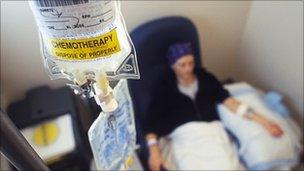Cancer survival figures 'double' since 1970s
- Published

Better cancer drugs are one reason for the survival improvements
Survival rates for some cancers have doubled over the past four decades, a charity has said.
People with breast, bowel and ovarian cancers, and non-Hodgkin's lymphoma, are now twice as likely to survive for at least 10 years than in the 1970s.
Cancer Research UK's figures show leukaemia survival is now four times as high, although the charity warned there was still much work to do.
The Department of Health said it was "delighted" by the findings.
Launching a television campaign, the charity said investment in research was key to further boosting survival.
The figures go back to the early 1970s and include estimated survival rates for the latest diagnoses made in 2007.
In breast cancer, 10-year survival has jumped from less than 40% to a predicted 77% currently.
And half of people diagnosed with bowel cancer are now expected to survive at least 10 years compared with 23% in the 1970s.
For ovarian cancer and non-Hodgkin's lymphoma, survival has increased from 18 to 35% and from 22 to 51% respectively.
In cancers such as oesophageal cancer and myeloma, although survival rates are still very poor at below 20%, rates have improved almost threefold over the past few decades, Cancer Research UK said.
However, some other cancers have shown little improvement, most notably lung and pancreatic cancer, the figures show.
'Real progress'
Professor Peter Johnson, Cancer Research UK's chief clinician, said: "There are many reasons for our continuing success in the fight against cancer, including faster diagnosis, better surgery, more effective radiotherapy and many new drugs, all developed using the knowledge that our laboratory research has given us."
He said with further investment in research, he expected the trend to continue.
Professor Michel Coleman, an expert in statistics at the London School of Hygiene and Tropical Medicine, who calculated the figures, said the survival data reflected "real progress" in cancer diagnosis and treatment.
"Ten-year survival figures for patients diagnosed in 2007 are of course predictions, but they are derived from the latest national data on cancer patient survival - and for most cancers, the true 10-year survival for these patients will turn out to be higher than we report."
The figures prompted Professor Mike Richards, the Department of Health's national cancer director, to say: "We are delighted to note these improvements in cancer survival.
"Improving health outcomes is a key priority for the coalition government and will be a major focus of the forthcoming review of the Cancer Reform Strategy."
Harpal Kumar, Cancer Research UK's chief executive, said the improvements being seen in cancer care were "encouraging, but we have to do better".
"We need to develop even more effective treatments that can prolong life further and we need to ensure that each individual patient has optimal treatment."